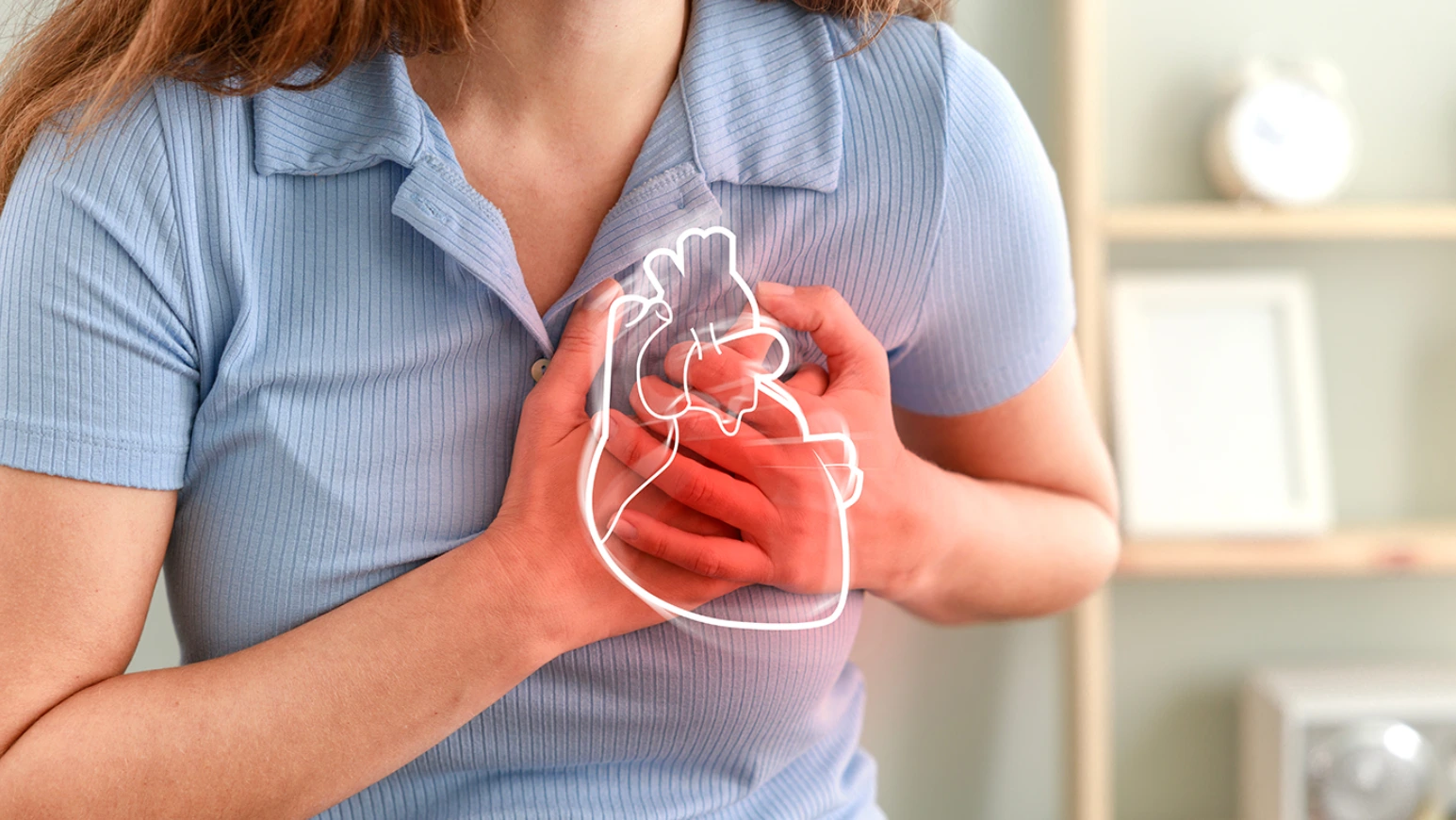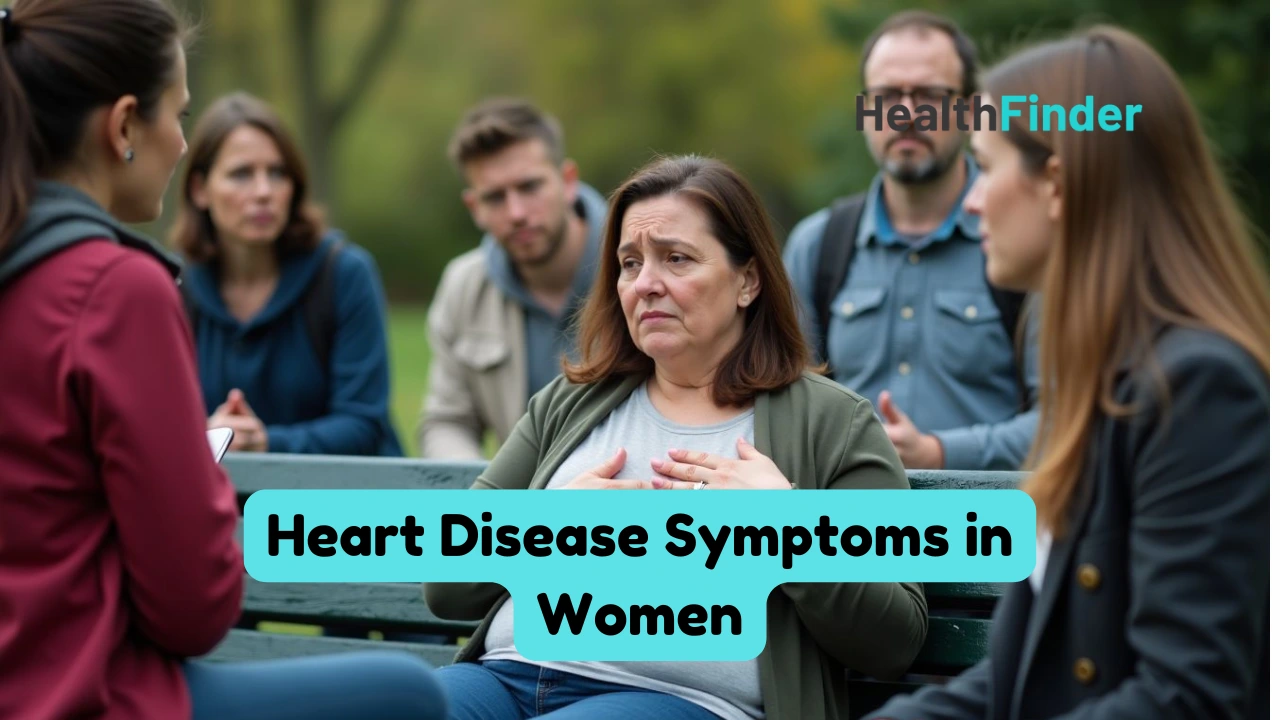Did you know that heart disease kills more women than all cancers combined? Yet, many women don’t recognise the early warning signs—often mistaking them for stress, ageing, or digestive issues. Unlike men, who typically experience sudden chest pain, women’s symptoms are often subtle but just as dangerous.
Ignoring these signs could lead to serious complications like heart failure, blocked arteries, or even a silent heart attack. Identifying them early could save your life.
Women’s heart disease symptoms differ from men’s, making them harder to detect. Fatigue, jaw pain, and shortness of breath are early signs that often go unnoticed. Chest discomfort may feel like tightness, pressure, or heaviness rather than sharp pain. Silent heart attacks in women are common—showing up as nausea, dizziness, or indigestion-like pain rather than typical chest pain.
Understanding these early symptoms and acting quickly is key to preventing life-threatening complications.
In the UAE, where cardiovascular disease is a growing concern among women, leading hospitals like Cleveland Clinic Abu Dhabi and Dubai Heart Centre stress the importance of regular heart screenings, managing high blood pressure, and recognising non-traditional heart symptoms in women.
According to the American Heart Association (AHA), women are 50% more likely than men to experience silent heart attacks, and 80% of cardiovascular diseases are preventable with early detection and lifestyle changes.
This blog explores the early warning signs of heart disease in women, highlighting subtle symptoms, risk factors, and the importance of early detection for better heart health.

Chest Discomfort or Pain
Chest pain or discomfort can feel like pressure, squeezing, or burning in the chest. It may spread to the upper body, such as the arms or shoulders. Women often describe it as a crushing weight or tightness that lasts longer than usual.
This could be a warning sign of blocked blood vessels or angina. Angina occurs when narrowed arteries limit blood flow to the heart muscle. Immediate attention prevents risks like silent heart attacks.
Shortness of breath might follow this symptom.
Shortness of Breath
Shortness of breath may signal heart disease in women. It often happens during simple activities like walking or climbing stairs. Some feel short of breath while lying down. This can point to issues with blood supply or heart valves.
Breathlessness without chest pain could be an early sign of a silent heart attack. Women after menopause might face added risks due to weakened cardiovascular health. High blood pressure and high cholesterol levels increase this risk further.
Seek medical care if you notice these symptoms persistently.
Unexplained Fatigue
Constant tiredness can point to heart problems. It may occur even without physical activity. Many women feel drained after doing small tasks, like climbing a few stairs or getting ready in the morning.
This could signal early signs of coronary artery disease or other serious cardiovascular issues.
Such fatigue often gets ignored but should not be taken lightly. The American Heart Association notes it as a common symptom, especially for silent heart attacks in women. High cholesterol or plaque buildup in blood vessels restricts proper blood flow, leaving you feeling weak and exhausted throughout the day.
Seek advice from a cardiologist if unusual fatigue persists without clear reason.
Pain in the Jaw, Neck, Back, or Arms
Fatigue can sometimes lead to overlooked symptoms, like pain in surrounding areas. Jaw pain or discomfort spreading to the neck, back, or arms may signal heart disease. This is common for silent heart attacks in women and often mistaken for muscle strain.
The left arm is more vulnerable during such incidents.
Blood vessels supplying these regions may narrow due to plaque buildup. Sudden upper back pain could also arise from blocked arteries. According to the American Heart Association, such referred pain often comes without chest discomfort.
Seek immediate care if this happens alongside nausea or irregular heartbeats.
Dizziness or Light-headedness
Dizziness or light-headedness can follow jaw pain, neck discomfort, or back aches. A weak heart may struggle to pump enough blood to the brain. This issue can cause sudden fainting or body imbalance.
Persistent dizziness could point to a serious heart condition like heart failure or coronary artery disease.
High blood pressure and poor circulation also play roles in this symptom. Women with risk factors for heart disease—like high cholesterol, physical inactivity, or stress—should not ignore it.
Seek medical attention if dizziness lasts long or happens often. Early detection can prevent more severe cardiovascular diseases later on.
Irregular Heartbeat or Palpitations
An irregular heartbeat or palpitations can signal heart conditions like coronary artery disease or heart valve disease. Women may feel their heart racing, skipping beats, or fluttering.
High blood pressure and plaque buildup in blood vessels often trigger these symptoms. Hormonal changes, such as reduced oestrogen levels during menopause, also raise cardiovascular risks.
Untreated sleep apnoea and stress increase the chance of an irregular heart rate. These signs might appear with nausea or chest pain—common symptoms of a silent heart attack in women.
Early detection through a stress test or an electrocardiogram (ECG) can help prevent severe issues.
Swelling in the legs, ankles, or feet is another warning sign to watch for next.
Swelling in the Legs, Ankles, or Feet
Swelling in the legs, ankles, or feet can signal heart problems. It happens when the heart cannot pump blood properly. This causes fluid to build up in tissues, leading to oedema. Heart failure is a common cause of such swelling.
Chronic inflammation from autoimmune diseases like lupus can also increase this risk. Conditions like high blood pressure and damaged heart valves worsen it too. Swollen limbs may feel heavy or tight and may leave a dent when pressed.
Always check with a doctor if you notice persistent swelling or discomfort.
Cold Sweats or Nausea
Cold sweats and nausea can signal heart disease. These warning signs often appear suddenly, even without physical activity. Women experiencing a silent heart attack may notice these symptoms more than chest pain or pressure.
Nausea could feel like indigestion or stomach pain, mimicking gastrointestinal issues. Cold sweats are not related to heat or exercise but stem from stress on the blood vessels or heart chambers.
Pay close attention if these symptoms arise with fatigue, jaw pain, neck pain, upper back pain, or shortness of breath. Seek medical care quickly to prevent heart failure or other complications.
Unusual Symptoms Unique to Women
Some women may have heart disease signs like stomach pain, nausea, or extreme tiredness—these symptoms can differ greatly from men’s experiences.
How Heart Disease Symptoms in Women Differ from Men?
Women often have heart attack symptoms that are less obvious than men’s. Instead of sharp chest pain, women may feel pressure or a squeezing sensation in their chest. They might also experience nausea, jaw pain, or upper back discomfort.
Gastrointestinal problems like stomach pain or feelings of choking occur more often in women during a heart attack. Emotional stress and unexplained fatigue can also signal risk. Early menopause before 45 years increases cardiovascular danger for many women too.
Addressing these risks leads to better care outcomes.
Conclusion
Heart disease is a serious health risk for women. Early signs like chest pain, fatigue, and jaw pain should not be ignored. Simple steps like regular check-ups and healthy lifestyle changes can make a big difference.
Pay attention to symptoms that feel unusual or sudden. Talk to your doctor about any concerns or family history of heart issues. Take action today—your heart depends on it!
For more detailed information on how heart disease symptoms in women distinctly differ from those in men, kindly visit Heart Disease Symptoms Unique to Women.
Also, Read:
FAQs for Early Warning Signs of Heart Disease in Women

Dr. Aisha Rahman is a board-certified internal medicine specialist with over 12 years of clinical experience in chronic disease management and preventive healthcare. She has worked at leading hospitals across the UAE, helping patients manage conditions such as diabetes, hypertension, cardiovascular diseases, and metabolic disorders.
A strong advocate for preventive medicine, Dr. Rahman emphasizes early diagnosis, lifestyle modifications, and patient education to reduce chronic illness risks. She is an active member of the Emirates Medical Association and has contributed to health awareness programs and medical research initiatives. Her expertise has been featured in The National UAE, Gulf Health Magazine, and leading medical journals. As a keynote speaker at healthcare conferences, she shares insights on evidence-based treatments, patient-centered care, and advancements in internal medicine.


